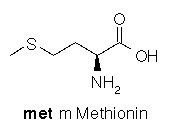"He who does not know food, how can he understand the diseases of man?" ~Hippocrates
Caloric restriction has been a hot topic in my course on “Aging” this past week, as it is a scientifically-proven method for prolonging life.
I also learned about another method for increasing longevity, and it has to do with the amino acid methionine. Here is a summary of the presentation I gave on it today:
**Note: I apologize for the technical nature of this post... if not interested in minutiae, please jump to the end for the short summary!**
Food with a high methionine content
Food with a low methionine content
What is methionine?
- An essential amino acid
- One of two sulfur containing amino acids
- In the metabolic pathway of S-adenosyl methionine (SAM) and homocysteine
- An intermediate in the biosynthesis of cysteine, carnitine, taurine, lecithin, phosphatidylcholine, and other phospohlipids
- Most fruits, vegetables, and legumes contain very little methionine
- Meats, fish, eggs, and some plant seeds have high levels of methionine
This study from 1993 showed that cutting dietary methionine by 80% in rats increased longevity by greater than 40% in both mean and maximal lifespan. The rats had free access to food and ended up eating more calories per gram of body weight. They were not calorie-restricted.
More recently, other researchers have confirmed these results and found that methionine-restricted mice (with normal calorie intake) had:
- Lower levels of IGF-1, insulin, glucose, and thyroid hormones (these changes are also found in calorically restricted animals)
- Delayed onset of clouding of the lens in the eye (cataracts)
- Delayed immune system changes (changes in T cell subsets)
- Livers more resistant to oxidative stress
- Decreased levels of mitochondrial oxidative damage
The following mechanisms have been suggested to explain these longevity findings from low-methionine diets:
- Endocrine changes including decreased IGF-1, T4, glucose, and insulin (all of which are important in the aging process)
- Hormesis (chronic low levels of stress builds “immunity” against bigger stressors)
- Changes in levels of s-adenosyl methionine (SAM) and homocysteine (thought to play a role in neoplastic, cardiovascular, and other aging-related diseases)
- Changes in glutathione (glutathione is protective against oxidative damage)
- General decline in protein synthesis (may be protective against age-related decline)
What might this mean for humans?
The vegan diet (which includes no animal products) is low in methionine. Here is why:
- The methionine content of plant proteins, legumes, soy, and nuts is lower than in animal proteins
- The overall protein content of plant-derived foods is lower than animal-derived foods
- Plant proteins are digested less efficiently than animal proteins
- Vegans have lower IGF-1 levels (suggested to be a “pacesetter” in the aging process”)
- Vegans have lower insulin levels (lower insulin levels leads to lower levels of IGF-1)
- Vegans have lower rates of diseases of aging, including cancer, diabetes, and cardiovascular disease
- A low-methionine diet in animal models has been proven to delay the aging process
- Vegan diets are low in methionine, and human studies on vegans provide some evidence for increased longevity in this population
- There are many remaining questions, and some of mine include: Calorie-restriction versus methionine-restriction – are they additive? What is the impact of methionine-restriction on fertility? How does methionine-restriction impact telomere length/telomerase activity?
I am curious about what the Calorie Restriction Society would think about this. Are there any Methionine-Restriction Societies? This idea of methionine-restriction might be something The Vegan Society could discuss/advertise.



Read "Effect of 40% restriction of dietary amino acids (except methionine) on mitochondrial oxidative stress and biogenesis, AIF and SIRT1 in rat liver." (http://www.ncbi.nlm.nih.gov/pubmed/19039676)
ReplyDeleteFascinating!!!! I read the abstract and can't wait to sit down and read this carefully. Thank you!
ReplyDeleteHi Rickard,
ReplyDeleteI just read through that paper - thank you again. It makes me even more convinced about this low methionine theory.
Are you aware of any prospective human studies looking at methionine restriction?
I have extremely low methionine and have been told to take it to fix my broken methylation system.
ReplyDeleteMethionine is an essential amino acid. It is required for your body to build new proteins to replace damaged ones within your body. Remember that you are made of meat and meat is high in methionone. So by all means reduce the amount of methionine in your diet but remember that a zero-methionine or extremely low-methionine diet would be as bad for you as a zero-calorie or exetremely low-calorie diet. You need some methionine every day. Just not too much.
ReplyDelete